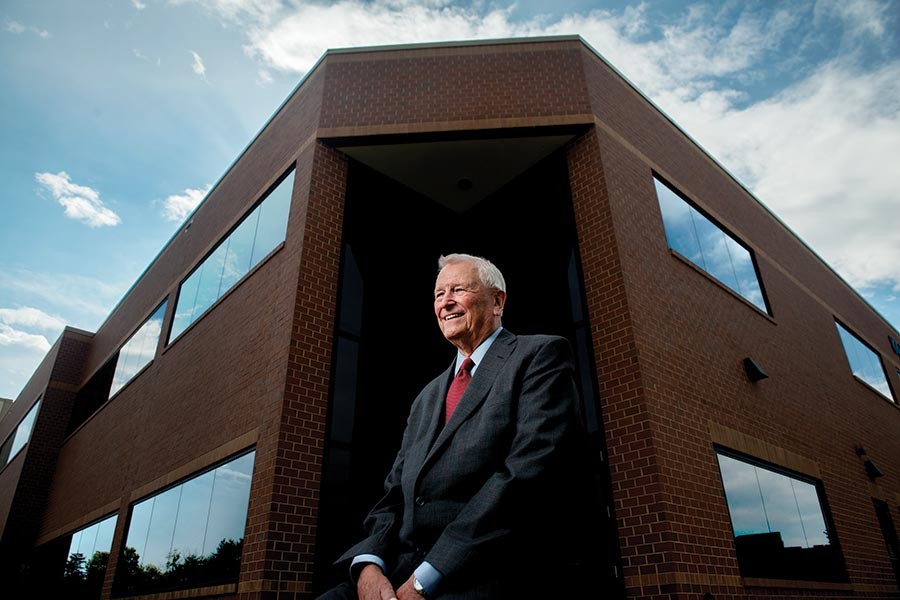R. Clayton Emory, A&S '56, was not satisfied. The founder of Emory Properties had devoted 16 years to the advisory board of Johns Hopkins' real estate program, but he still felt the program needed more attention to become world-class. Someone needed to take action, and this year he did when he made a gift to establish the first-ever endowed chair at the Carey Business School, the R. Clayton Emory Chair in Real Estate and Infrastructure.
"I wanted to make sure the future was solid," he recalls. "Real estate is cyclical—there are good times and bad—and it can be difficult to attract people to a program during the bad times. I wanted there to always be someone [at Carey] who knows real estate and could teach it so that the real estate program would never end up being one course on the principles of real estate development."
The creation of the chair underlines the school's commitment to real estate and infrastructure studies.
The Carey Business School's Edward St. John Real Estate Program blends traditional courses such as business communication, leadership, statistical analysis, and corporate finance with 16 classes related to real estate and infrastructure. The new chair will be a reputational boon to the program and will help attract top talent. "This endowment gives the Carey Business School the ability to retain and recruit respected faculty leadership to our real estate and infrastructure program," says Bernie Ferrari, professor and dean of the Johns Hopkins Carey Business School. "The establishment of the first endowed faculty chair at Carey is a significant step in our growth."
Now 81, Emory has had a long and productive career in commercial real estate, garnering through years of experience the breadth of knowledge he wants Carey School students to explore through the curriculum. Emory Properties, which he founded in 1967, operates in eight states and has built approximately 12 million square feet of commercial space.
At Johns Hopkins, where he studied business and industrial management, Emory learned the importance of scheduling and budgeting and how to run a cost analysis—knowledge that was foundational to his understanding of real estate investment opportunities. After graduating, he went on to receive an MBA from the University of Pennsylvania's Wharton School. But it was as a commercial mortgage underwriter for the Rouse Company, at the intersection of construction and finance, that he really learned the business. "When a developer came in with a proposed project, it was my job to underwrite the project, so I had to learn to look at the value and assess the risk of these new developments," he says. "That's really how I got started as a developer. I loved building things and having the opportunity to finance things to make them viable."
Since starting that job in 1961, Emory has watched the commercial real estate field evolve. Independent developers now share the field with large real estate investment trusts; there is more government regulation on development; and the global economy, particularly the trade in international goods, impacts commercial real estate, even at a local level. It was important for Emory that the recipient of the endowed chair be someone as knowledgable about international trends as local ones.
Professor Ko Wang fit the bill. Prior to joining the Johns Hopkins real estate program in 2014, Wang held a chaired position at the Zicklin School of Business at Baruch College of the City University of New York, and at the Chinese University of Hong Kong. Wang says he came to Johns Hopkins in part because it combines the best practices from a traditional Master of Science program and an MBA. He explains that the curriculum pays attention to both the development and investment aspects of the real estate market. Students learn the fundamentals of developing real estate as well as how to work with real estate as an asset in a portfolio. This is important because while some students will go on to jobs with developers and consulting firms, others will become entrepreneurs or take positions with investment firms or publicly traded real estate investment trusts. "Real estate has become an integral part of Wall Street," he says. "In the '70s and '80s, the industry was very development-focused. Today we need to think about liquidity and investment aspects as well."
Emory has watched these industry shifts happen. "I always say development is pretty easy. You buy land and build something," says Emory. "But in reality, it's a pretty hard thing to pull off." He hopes his gift will help the next generation of real estate professionals emerge prepared not only to compete in a global marketplace but to improve their communities.
Learn more about endowed deanships, directorships, professorships, and chairs at http://professorships.jhu.edu.
Posted in University News








